Hoy realizaremos este “vis a vis” con Javier Cubero, un humorista gráfico cuyas obras me gustan mucho. Pero, además, tenemos otra cosa que nos enlaza: él pertenece al equipo de la publicación humorística cubana Melaíto y yo tengo una sección fija desde hace tiempo en esa publicación con mis fotomontajes, por lo que me siento parte del equipo ya. A esa revista la quiero también, porque soy amigo de su primer director Pedro Méndez y su actual Alfredo Martirena (ambos ya entrevistados en este espacio) y soy admirador de la obra de otros colegas antiguos y nuevos de ese gran colectivo, como Ajubel, Linares, Panchito (también entrevistado aquí), etc.
Pero veamos algunos datos de su biografía:
Cuenta en su haber con cinco exposiciones personales y más de cincuenta colectivas. Ha obtenido premios y distinciones importantes en Cuba (varias veces), Turquía, Italia, Colombia, China, Siria, Kosovo, Iraq y Bulgaria.
Es coautor de títulos como “A mal tiempo buena cara”, “1/4 de humor” y “Afilando la punta”, pertenecientes a la publicación humorística Melaíto. Además, su obra aparece en la antología “Caricatura Cubana Contemporánea”.
Ha colaborado en los periódicos Diario Monitor y “Unomásuno de México , en las revistas humorísticas Chocarreros y Humoris Causa de ese propio país, así como en la revista francesa Courrier international, entre otras publicaciones nacionales y extranjeras.
En fin, un sólido representante del humor de calidad cubano.
(Este “vis a vis” lo realizamos en 2025).
PP: Bueno, Javier para los seguidores de Humor Sapiens, ¿puedes presentarte? (Porque quizás mi presentación fue incompleta). Por ejemplo, ¿xómo te gustaría que te conocieran, que te recordaran, cuando ya no estemos aquí?
JAVIER: Mi nombre es Javier Cubero Torres, soy caricaturista y redactor humorístico miembro de la publicación humorística Melaíto de Cuba. Me gustaría que me conocieran como un hombre apasionado al humor gráfico, y que me recordaran de igual manera.
PP: Creo que así te recordarán. Bien, amigo, comencemos a saber de ti, a ver, ¿en qué momento decidiste dedicarte al humor?
JAVIER: Desde muy joven supe que esto era lo que me gustaba y quería ser en mi vida, a través del dibujo siempre estaba haciendo chistes a cualquier hora y en cualquier lugar, incluso en la escuela, también en el barrio, y luego en los diferentes centros de trabajos donde laboré.
PP: Estabas destinado a hacernos reír. Y a propósito, ¿el humorista nace o se hace?
JAVIER: El humor nace, es un don que le da la vida a algunas personas para ejercer una profesión, que no se estudia en ninguna escuela de arte ni en la universidad. Obviamente, con el paso del tiempo vas perfeccionando tu trabajo y aprendiendo de otros que te antecedieron.
PP: Yo también creo que se nace y después se hace. Aunque a veces nace alguien sin gran vis cómica, pero superándose llega a ser un humorista, claro, nunca tan completo como el que nace. Bueno, como debe haber alguien que nazca bueno para hacer llorar, ¿no es cierto? Y sobre eso, ¿para ti es más fácil hacer llorar que hacer reír, como dicen algunos?
JAVIER: Claro que es mucho más fácil hacer llorar que hacer reír, creo yo. Como te comentaba anteriormente, el arte de hacer reír es muy difícil, de hecho, no todos los humoristas gráficos lo logran.
PP: Sí, aunque depende también de muchas cosas, por ejemplo, hay que descubrir si tienes talento para tal o más cual tipo de humor. Y ahora te pregunto: Dime cuál es el humor que más te gusta hacer. Te doy variantes:
a-El que simplemente te divierte.
b-El que te divierte y te hace pensar.
c-El que te hace pensar, pero sólo es crítico, satírico.
d-El burlesco, irrespetuoso, ofensivo.
¿Y por qué no escogiste los otros? (si es que dejaste alguno sin escoger, claro)
JAVIER: Prefiero el que te divierte y a la vez te hace pensar, sin menospreciar otro tipo de humor. El arte de hacer reír es muy difícil, por eso disfruto mucho “arrancarle” al menos una sonrisa a la gente, siempre utilizando un humor fino e inteligente, nunca burlesco, irrespetuoso y mucho menos ofensivo.
PP: De acuerdo total. Detesto el humor agresor, ofensivo, humillante. Inclusoo creo que la mayoría de los colegas que usan ese tipo de humor, lo hacen porque no tienen talento para el llamado humor inteligente (que no es más -para mí-, que ese humor elaborado que produce en el público la satisfacción de sentirse inteligente, porque descifró, entendió, el mensaje del artista). Pero vamos ahora a acercarnos a tu obra, para que los lectores de Humor Sapiens se conozcan más. Por ejemplo, ¿empezaste a dibujar sin estilo? Si tuvieras uno, ¿cuál estilo sería? ¿Tuviste alguna influencia de caricaturistas nacionales o extranjeros en ese momento? ¿Cómo ha evolucionado tu trabajo a lo largo del tiempo en términos de forma y contenido?
JAVIER: Cuando comencé a dibujar no tenía un estilo propio, luego con el transcurso de los años fui acumulando la experiencia que me permitió encontrarlo, aunque no sepa definirlo exactamente. Desde mis inicios, incluso antes de comenzar a colaborar con Melaíto, me sentí influenciado por el trabajo de Pedro Méndez, Alfredo Martirena y Félix Adalberto Linares, ellos son mis referentes en el humor gráfico y les tengo mucho que agradecer.
PP: A buenos árboles te arrimaste. Y, oye, ¿qué prefieres: dibujar con humor sin palabras o dibujar con textos? Y por qué, claro.
JAVIER: Considero que mi trabajo ha ido creciendo en todos los aspectos del proceso creativo, la constancia y dedicación me han dado las herramientas necesarias para poder incursionar en diversas facetas del humor gráfico y llevar mi obra a otras latitudes.
No tengo preferencia alguna, me gusta trabajar el humor de ambas formas, cada una de ellas me ofrece la posibilidad de abordar diversas temáticas, llegarle a todo tipo de público y hacer más universal mi obra.
PP: Correcto. Aunque más universal es el de sin textos, por supuesto. Es el que más se utiliza en lso concursos internacionales. A propósito, entre los muchos premios que has recibido, ¿cuál te conmovió más o te impactó más?
JAVIER: Te confieso que para mí todos los premios tienen igual relevancia, incluso, mi concepto de premio va más allá de un reconocimiento en determinado concurso, premio para mí también es todo lo que con mucho esfuerzo y dedicación he logrado en mi carrera. Por ejemplo, esta posibilidad que me has dado de ser entrevistado también Lo considero un premio.
PP: Gracias por considerarlo así. Me honra. Pero el tema es más profundo, por eso no es el espacio para que lo analicemos. Te digo matices del tema: ¿uno crea para recibir reconocimiento o no?, ¿además de la cuestión del ego, son importantes si llegan esos premios para estimularte? Uno aprende de los errores, sin dudas, ¿pero aprende también de los triunfos? En fin, da para mucho, sin contar el tema específico de los concursos. Pero ahora pongámonos más aburridos, aunque el asunto es bien relevante: ¿cuáles son los límites del humor, si los hubiera? ¿Fuiste censurado alguna vez? ¿Te autocensuras mucho, poco o nunca?
JAVIER: Para mí el humor no tiene límites, siempre y cuando se haga con toda ética profesional y humana, sin necesidad de llegar a la vulgaridad.
No recuerdo haber sido censurado alguna vez, y no soy de autocensurarme mucho.
PP: Me alegro por ti. Si lo dices, te creo. Pero no es mi caso. Me han censurado varias veces, ya sea por asuntos políticos, intereses económicos y hasta por la ignorancia de quien produce y dirige. Y yo sí me autocensuro mucho. Por ejemplo, si tengo que publicar un simple chiste en un país con gobierno totalitario, evito crearlo porque iría hasta preso. Si tengo que hacer un chiste contra un producto y sé que la empresa que comercializa ese producto auspicia el espacio donde publico, evito crearlo porque no lo aprobarían y hasta me podrían echar del trabajo. Si se me ocurre un chiste de humor negro sobre enfermos de cáncer, no lo harían ante ellos. Si se me ocurre un chiste sobre Alá, no lo haría, porque algunos de esos fanáticos asesinos me matarían como lo de Charlie Hebdó. ¿Soy quizás oportunista? Quizás, sí. Por eso te digo que me autocensuro. Sin embargo, estoy completamente convencido de que es fundamental en la vida, la libertad de expresión. Y jamás prohibiría un chiste que yo no haría. El que quiera hacerlo que lo haga. El colega sabrá a qué atenerse. Pero la libertad de expresión, insisto, es lo más importante, aunque te digo, yo no esté de acuerdo con el mensaje (recuerdos a Voltaire). Bueno, disculpa que me extendí, pero me apasiona el tema. Y ahora para relajar y animar este momento tan “serio”, ¿podrías contarnos alguna anécdota cómica, curiosa o ingeniosa, que hayas vivido durante tu trayectoria en el humor?
JAVIER: En el año 1997, la Editorial Capiro de Santa Clara, publicó el libro de humor erótico “Afilando la punta” el cual incluía varios trabajos míos, Por esa fecha tuve la necesidad de viajar de Santa Clara a Camajuaní, lo hice en ómnibus y me tocó ir de pie, delante de mí iban sentadas dos estudiantes de medicina, una de ellas llevaba entre sus manos dicho libro, ambas lo estaban disfrutando, pero al parecer, una de las muchachas no entendió una caricatura con doble sentido, casualmente mía, y con discreción le preguntó a su amiga cuál era el chiste. Su colega me miró algo apenada y con mucha cautela para que yo no la escuchara, se le acercó y tapando su boca con una mano le susurró al oído cual era el chiste, acto seguido, ambas rieron de manera muy picaresca.
A las pocas personas que les he hecho esta anécdota han coincidido en hacerme la misma pregunta, ¿y no les dijiste que la caricatura era tuya?, y a todos les he respondido con toda sinceridad, ¡no, no lo hice!
PP: ¿Y no les dijiste que la caricatura era tuya?, ja, ja. No, está bien. De igual forma es muy especial esa emoción que se siente cuando alguien halaga una obra tuya y no sabe que el autor está ahí, parado a tu lado. Me ha sucedido con niños en Ferias del libro y tampoco les he dicho que el autor del libro soy yo. Sí, a pesar de orgullo que da, también da vergüenza decirlo uno mismo. Bueno, volviendo al análisis del humor: ¿cómo ves el presente y el futuro del humor gráfico? Tanto en Cuba como en el mundo.
JAVIER: En sentido general, considero que el presente del humor gráfico goza de muy buena salud, por lo que presagia que el futuro esté garantizado.
PP: Creo que eres muy optimista. Me hace feliz que pienses así. Te lo digo, porque muchos creen que con los continuos cierres de medios de prensa plana, se van los espacios naturales donde habitaba el humor gráfico y la posibilidad de Internet no se ve bien por ahora, hasta que se resuelvan las formas de pago. Parece que soy algo pesimista, a pesar de ser humorista. Y me cuelgo de esto último, ¿qué me puedes aconsejar a mí, como humorista?
JAVIER: Mi consejo sería que continúes realizando el excelente trabajo que haces con tanta profesionalidad, entrega y amor, una labor que agradecemos todos tus colegas y admiradores de todo el mundo.
PP: Muchas gracias, amigo mío. Me honras de nuevo, te lo afirmo de corazón. Bueno, por último, ¿le puedes dirigir unas palabras a los lectores de Humor Sapiens?
JAVIER: A los lectores les sugiero que continúen al lado de Humor Sapiens para que puedan seguir disfrutando del buen humor que se hace alrededor del mundo, y para que se mantengan informados sobre todo lo que acontece en el humor gráfico a nivel internacional.
PP: Querido Javier, te agradezco infinitamente que hayas aceptado estar en este “vis a vis”. Sé lo ocupado que estás. Te doy mi palabra que la pasé estupendamente bien.
Por favor, salúdame a todos los colegas del Melaíto.
Te deseo mucha salud, suerte y muchísimos éxitos más en tu excelente carrera en el humor.
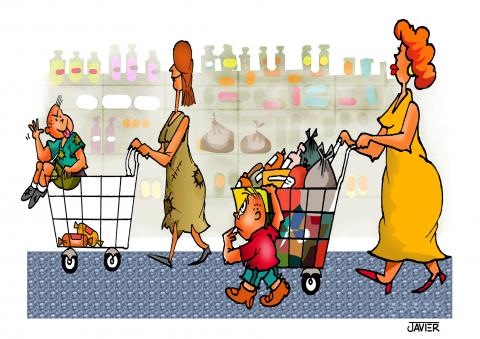
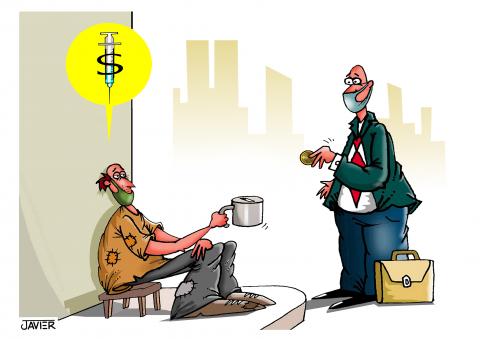
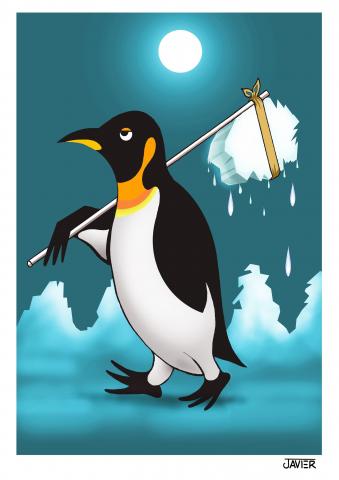
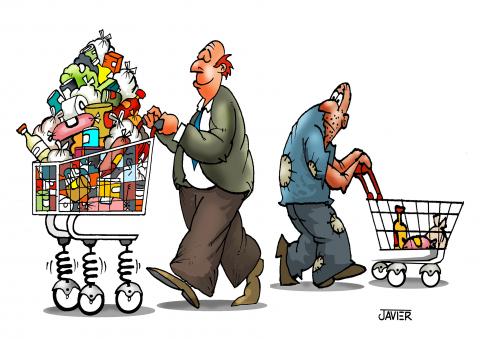
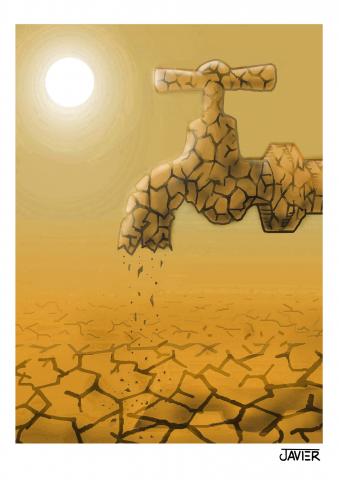
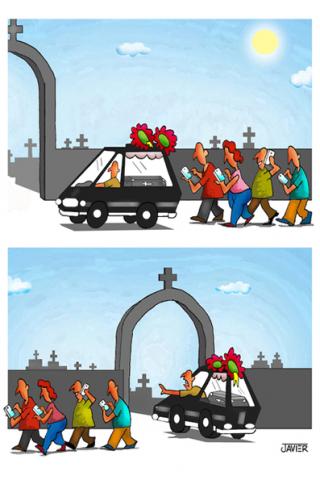
Interview with Javier Cubero Torres
by Pepe Pelayo
Today we will hold this "vis-à-vis" with Javier Cubero, a graphic humorist whose works I greatly admire. But beyond that, we share another connection: he is part of the team of the Cuban humor magazine Melaíto, and I have had a regular section in that publication for a long time with my photomontages, so I already feel like part of the team. I also hold this magazine dear because I am friends with its first director, Pedro Méndez, and its current director, Alfredo Martirena (both already interviewed in this space), and I admire the work of other veteran and new colleagues from this great collective, such as Ajubel, Linares, and Panchito (also interviewed here), among others.
But let's take a look at some facts from his biography:
He has held five solo exhibitions and participated in more than fifty group exhibitions. He has won important awards and distinctions multiple times in Cuba, as well as in Turkey, Italy, Colombia, China, Syria, Kosovo, Iraq, and Bulgaria.
He co-authored books such as A mal tiempo buena cara, 1/4 de humor, and Afilando la punta, all part of Melaíto. Additionally, his work appears in the anthology Caricatura Cubana Contemporánea.
He has collaborated with newspapers such as Diario Monitor and Unomásuno in Mexico, with humor magazines Chocarreros and Humoris Causa from the same country, as well as the French magazine Courrier International, among other national and international publications.
In short, he is a solid representative of high-quality Cuban humor.
(This "vis-à-vis" was conducted in 2025).
PP: Well, Javier, for the followers of Humor Sapiens, can you introduce yourself? (Because my introduction might have been incomplete). For example, how would you like to be known and remembered when we are no longer here?
JAVIER: My name is Javier Cubero Torres, and I am a cartoonist and humor writer, a member of the Cuban humor magazine Melaíto. I would like to be known as someone passionate about graphic humor and remembered the same way.
PP: I believe that is how you will be remembered. Well, my friend, let's start learning more about you. At what point did you decide to dedicate yourself to humor?
JAVIER: From a very young age, I knew this was what I loved and wanted to be in life. Through drawing, I was always making jokes at any time and place—even at school, in my neighborhood, and later at various workplaces.
PP: You were destined to make us laugh. And speaking of that, is a humorist born or made?
JAVIER: Humor is born; it is a gift that life gives some people to pursue a profession that is not taught in any art school or university. However, over time, you refine your work and learn from those who came before you.
PP: I also believe one is born with it and then develops it. Because sometimes, someone without a strong comic sense can improve and become a humorist, although never as complete as someone naturally gifted. Just as some people are born to make others cry, right? Speaking of that, do you think it is easier to make someone cry than to make them laugh, as some say?
JAVIER: Of course, I believe making someone cry is much easier than making them laugh. As I mentioned before, the art of making people laugh is very difficult; in fact, not all graphic humorists succeed at it.
PP: Yes, although it also depends on many things, like discovering whether you have talent for a specific type of humor. Now tell me, which type of humor do you most enjoy creating? Here are some options:
a) The one that simply entertains you.
b) The one that entertains you and makes you think.
c) The one that makes you think but is purely critical or satirical.
d) The mocking, disrespectful, offensive one.
And why didn’t you choose the others (if you left any out)?
JAVIER: I prefer humor that entertains and makes people think at the same time, without undermining other types of humor. The art of making people laugh is difficult, which is why I enjoy "stealing" at least a smile from people, always using refined and intelligent humor—never mocking, disrespectful, or offensive.
PP: I totally agree. I detest aggressive, offensive, and humiliating humor. I believe most comedians who use that type of humor do so because they lack the talent for so-called intelligent humor—which, to me, is just well-crafted humor that makes the audience feel intelligent because they understand the artist's message. But let’s now focus on your work so that Humor Sapiens readers can get to know you better. Did you start drawing without a style? If you have one, how would you define it? Were you influenced by national or international cartoonists at that time? How has your work evolved over time in terms of form and content?
JAVIER: When I started drawing, I didn't have my own style. Over the years, I accumulated experience that allowed me to develop one, although I can't define it precisely. Since my beginnings, even before collaborating with Melaíto, I was influenced by the work of Pedro Méndez, Alfredo Martirena, and Félix Adalberto Linares. They are my references in graphic humor, and I have much to thank them for.
PP: You had great mentors. And tell me, do you prefer drawing humor without words or with text? And why?
JAVIER: I believe my work has grown in all aspects of the creative process. Consistency and dedication have given me the tools to explore various facets of graphic humor and expand my work internationally. I don’t have a preference—I enjoy working with both approaches because each allows me to tackle different themes, reach a wide audience, and make my work more universal.
PP: Correct. Although wordless humor is more universal, of course. That’s the one most commonly used in international contests. Speaking of which, among the many awards you've received, which moved or impacted you the most?
JAVIER: To be honest, all awards hold the same importance for me. In fact, my concept of a prize goes beyond recognition in a specific competition. To me, a prize is also everything I have achieved in my career through effort and dedication. For example, this opportunity to be interviewed—I also consider it a prize.
PP: Thank you for considering it that way. I’m honored. But the topic is deeper, so this isn’t the space to analyze it fully. Here are some aspects to consider: Do we create for recognition or not? Beyond the issue of ego, are awards important if they serve as motivation? We undoubtedly learn from mistakes, but do we also learn from triumphs? There’s a lot to unpack here, not to mention the specific topic of contests.
But now, let’s get a bit more serious—though the subject is highly relevant: What are the limits of humor, if any? Have you ever been censored? Do you self-censor a lot, a little, or never?
JAVIER: For me, humor has no limits as long as it is done with full professional and human ethics, without resorting to vulgarity.
I don’t recall ever being censored, and I don’t self-censor much.
PP: I’m happy for you. If you say so, I believe you. But that hasn’t been my case. I have been censored several times—whether for political reasons, economic interests, or even the ignorance of those who produce and direct. And yes, I do self-censor a lot.
For example, if I have to publish a simple joke in a country with a totalitarian government, I avoid creating it because I could end up in prison. If I want to make a joke about a product but know that the company selling it sponsors the space where I publish, I avoid it because it wouldn’t be approved, and I could even lose my job. If I think of a dark humor joke about cancer patients, I wouldn’t tell it in front of them. If I come up with a joke about Allah, I wouldn’t tell it, because some extremist might kill me—like what happened with Charlie Hebdo.
Am I perhaps opportunistic? Maybe, yes. That’s why I say I self-censor. However, I am completely convinced that freedom of expression is fundamental in life. And I would never ban a joke that I personally wouldn’t make. If someone wants to make it, they should go ahead. Every comedian knows what they’re risking. But, I insist, freedom of expression is the most important thing—even if I don’t agree with the message (greetings to Voltaire).
Well, sorry for rambling, but I’m passionate about this topic. Now, to lighten things up after this “serious” discussion, could you share a funny, curious, or witty anecdote from your career in humor?
JAVIER: In 1997, Editorial Capiro from Santa Clara published the erotic humor book Afilando la punta, which included several of my works. Around that time, I had to travel from Santa Clara to Camajuaní by bus, and I ended up standing. In front of me, two medical students were seated. One of them was holding that book, and both were enjoying it. But apparently, one of the girls didn’t understand a double-entendre cartoon—coincidentally mine.
Discreetly, she asked her friend to explain the joke. Her friend, looking slightly embarrassed and cautiously trying to keep me from hearing, leaned in, covered her mouth with her hand, and whispered the explanation. Immediately afterward, both laughed mischievously.
Whenever I tell this story, people always ask me the same thing: "And did you tell them that the cartoon was yours?" To which I always respond sincerely: "No, I didn’t!"
PP: And you didn’t tell them it was yours? Ha, ha. No, that’s fine. It’s still a special feeling when someone praises your work without knowing the author is standing right next to them. It has happened to me with children at book fairs, and I also didn’t tell them that I was the author. Yes, despite the pride it brings, it’s also a bit embarrassing to say it yourself.
Well, back to humor analysis: How do you see the present and future of graphic humor, both in Cuba and worldwide?
JAVIER: In general, I believe that graphic humor is in good health today, which suggests that its future is secure.
PP: I think you’re very optimistic. I’m glad for you. But many people believe that with the continuous shutdown of print newspapers, the natural spaces for graphic humor are disappearing, and the potential of the internet hasn’t been fully realized due to unresolved payment models.
It seems I’m a bit of a pessimist, despite being a humorist. And speaking of that, do you have any advice for me as a fellow humorist?
JAVIER: My advice would be to keep doing the excellent work you do with such professionalism, dedication, and love—a job that all your colleagues and admirers around the world appreciate.
PP: Thank you so much, my friend. You honor me again, and I truly appreciate it. Well, lastly, could you say a few words to the readers of Humor Sapiens?
JAVIER: I encourage readers to continue following Humor Sapiens so they can keep enjoying the great humor being produced worldwide and stay informed about everything happening in international graphic humor.
PP: Dear Javier, I sincerely thank you for accepting this vis-à-vis. I know how busy you are. I had an absolutely fantastic time.
Please send my regards to all the colleagues at Melaíto.
I wish you good health, luck, and much more success in your outstanding humor career.
(This text has been translated into English by Google Translate)

